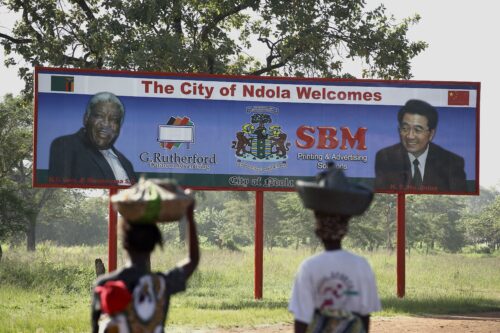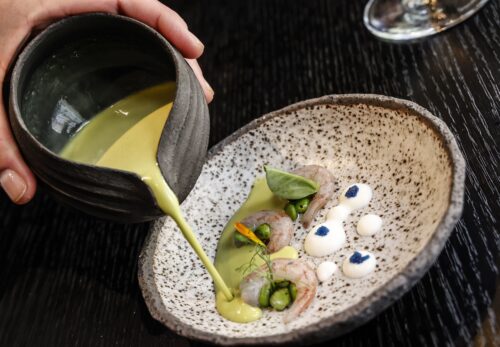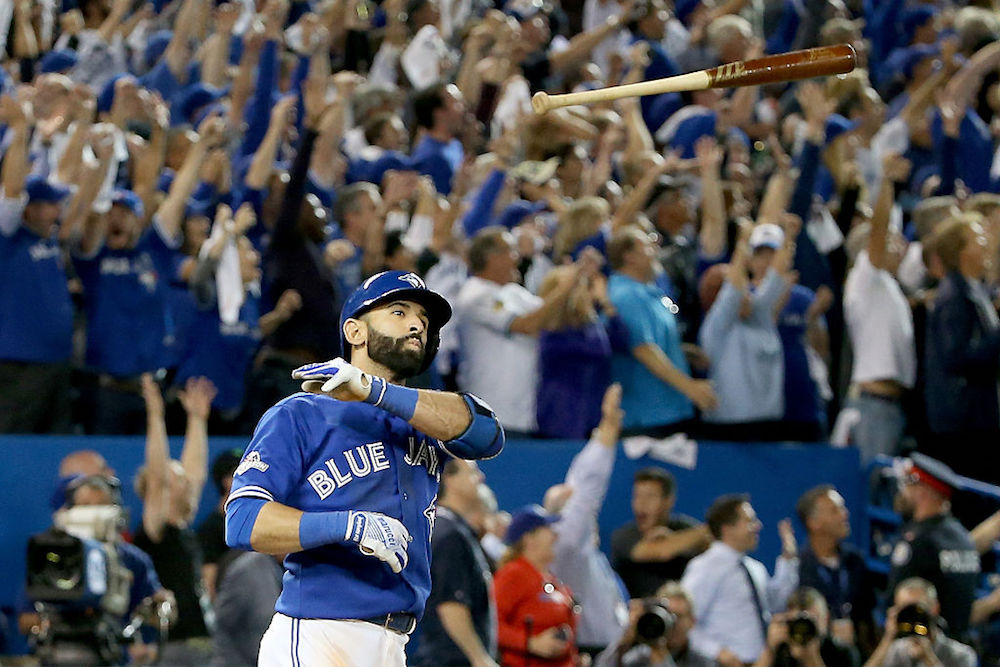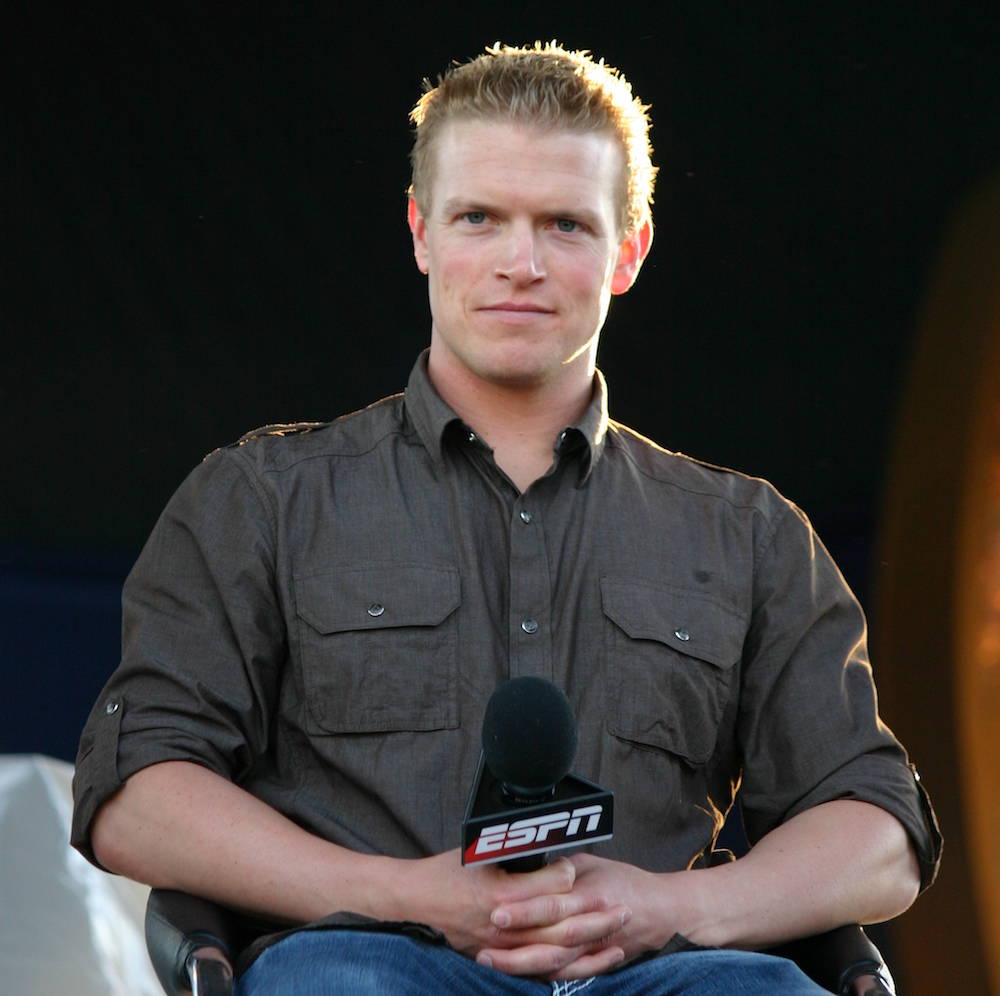What Does Baseball’s Bilingualism Reveal?
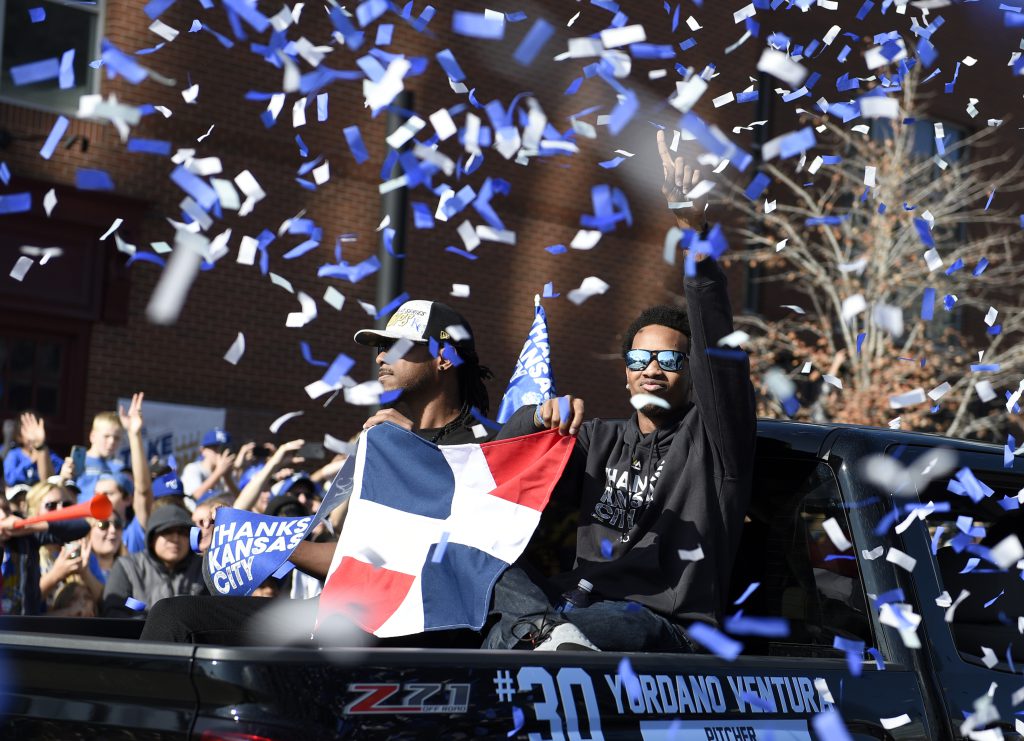
In a raucous locker room in La Romana, Dominican Republic, a shaggy, bearded white man had just been awarded a ceremonial necklace—a comically large chain with his team’s logo, a giant “T,” suspended from it—by his cheering teammates. The necklace went to the hero of the day, and on this occasion, it was Hunter Pence, a 36-year-old outfielder, erstwhile San Francisco Giant, and, at the time of his heroics, a member of the Toros del Este of the Dominican Winter League. The league is the province of up-and-coming Dominican prospects, Latin American baseball lifers, and in Pence’s case, out-of-work veterans from Major League Baseball.
On that day back in December 2018, Pence had scored a game-winning home run with his team in the hunt for the playoffs. As the team clamored for a speech, the newly bedecked hero, only a little reluctant, tried to mount a flimsy plastic chair, shouting, “Let’s go, let’s go—whoop!” One foot fell off, and he made a second, successful attempt at standing and gestured with his arms to quiet his adoring teammates. He waved his hands in front of him, as if to downplay his accomplishment: “OK, OK, hey. Eso juego no es much importante,” which roughly translates to, “That game isn’t too much important.”
Pence’s utterance could have been mistaken for what linguistic anthropologist Jane Hill termed Mock Spanish—which, Hill and others have argued, underscores U.S. society’s disregard for Spanish speakers, despite its lighthearted tone. But there was no hint of mockery. The speaker flashed a self-deprecating smile, and his teammates sported huge grins on their upturned faces, egging him on. “But—pero es—es very important to improve”—he interrupted himself, appealing to someone off camera: “How do you say ‘improve’ in Spanish?” “Mejorar, mejorar!” came the shouts from all corners. “Constantly improve, get better,” he continued, churning his right arm. “We got one more game, let’s bring it!”
Pence’s unapologetically amateurish mixing of Spanish and English, which linguists might call “codeswitching” or “translanguaging,” hints at why professional baseball is a fascinating place to explore questions about multilingualism and linguistic border-crossing. As baseball teams pursue talent from around the world and as players follow opportunities to far-flung locations, clubhouses become microcosms of the dizzying linguistic diversity found in settings shaped by migration and globalization.
Several migrant streams converge in baseball: Teenage Latino phenoms (like Juan Soto, now 21, of the current world champion Washington Nationals) are groomed for stardom in the United States, while English monolinguals from the U.S. (like Hunter Pence) end up playing in the Dominican Republic, Venezuela, Korea, Taiwan, or Australia, and accomplished Japanese and Korean players (like Masahiro Tanaka) make mid-career moves to U.S. teams—not to mention the experiences of Cuban émigrés like Yasiel Puig, who was smuggled to the U.S. through Mexico under harrowing circumstances.
Unexpected uses of language are worth talking about, in part, because they disrupt assumptions about other aspects of identity like race and nationality. Why did Pence’s teammates treat his speech as a significant moment, judging by their reactions? Why was the clip passed around on social and mainstream media? (I first saw it on ESPN’s now-discontinued talk show High Noon.) Why was it treated as worthy of comment?
These are baseball-specific versions of questions that are much bigger than baseball: Why is some people’s bilingualism seen as exceptional while others’ is taken for granted? Venezuelan-born Salvador Pérez, the universally adored catcher for the Kansas City Royals, has boldly translanguaged his way through many a postgame interview, but I’ve never seen his linguistic performances singled out as praiseworthy or even noteworthy.
And another question: Why is bilingualism held up as morally admirable in one instance but treated as suspect in another? The hubbub surrounding Pence’s speech testifies to what the late scholar Richard Ruiz called the “paradox of bilingualism” in the U.S.: Immigrants and nonnative speakers of English are expected to discard other languages in favor of English as an integral part of the “conversion experience” of becoming fully American. When native English speakers pursue other languages, however, they’re seen as impressive, sophisticated, and intelligent. Sociolinguist Guadalupe Valdés observed that the same tendency distorts the equity focus of many bilingual education programs in favor of “elite bilingualism.”
Unexpected uses of language are worth talking about, in part, because they disrupt assumptions about other aspects of identity like race and nationality.
Pence’s contemporary, Nate McLouth, another white outfielder who was raised as an English monolingual in Michigan, is an outstanding example of this phenomenon. Unlike Pence, who appears to have added bits of Spanish to his mainly English repertoire during a short stay in the Dominican Republic, McLouth—a less accomplished, though solid player for several teams—has been lauded for his near-native command of Spanish.
“It’s amazing when you see an American guy speaking perfect Spanish,” said Alexi Casilla, his teammate on the Baltimore Orioles, during a television interview. “I think he’s Dominican. I think his real name is Manuel Peralta,” he quipped.
McLouth’s Spanish, according to the network, “brings the clubhouse together,” while Casilla’s English is given no such credit. Like McLouth, I’m a proficient Spanish speaker who grew up as an English monolingual, and I can attest to the power of the paradox of bilingualism to make elite bilinguals, like us, seem exceptional and impressive—so impressive, in fact, that Casilla had to invent a Dominican alter ego, “Manuel Peralta,” to account for McLouth’s performance.
The boost in prestige that McLouth and I enjoy happens at the expense of those whose bilingual abilities are seen as less valuable or taken for granted. For all the positive coverage of native English-speakers’ bilingualism, “language panics” rear their heads from time to time in baseball. Language panics, as Hill defined them, are societal controversies in which language takes center stage. But language often stands in for dimensions of social difference—such as race and/or class—that are less comfortable or socially acceptable to discuss.
In baseball’s language panics, a white, native English-speaker’s bilingualism (or lack thereof) is never called out as the problem. No, the panic takes the form of Red Sox announcer Jerry Remy’s grumbling that Japanese-born Yankees pitcher Tanaka should “learn baseball language” and shouldn’t be allowed to use an interpreter during games (the broadcaster later apologized for the offensive comments). It surfaces in Phillies Hall of Famer Mike Schmidt’s contention that then-promising Phillies outfielder Odúbel Herrera (since suspended for violating the league’s domestic violence policy), a native of Venezuela, would never be a team leader because of the “language barrier”—despite the fact that many of his teammates were native speakers of Spanish.
It’s a short leap from anxieties about language to concerns about the changing face of baseball and the resulting transformation of U.S. baseball culture—in particular, the dominance of young Latino players whose understanding of appropriate baseball behavior raises hackles among U.S. players, ex-players, and coaches steeped in a different set of norms. Schmidt linked Herrera’s supposed lack of leadership ability to his lack of English but also to his “antics” and “exuberance.”
These words are actually coded language for young Latino players’ demonstrative on-field style, exemplified in bat flips and standing back to admire home runs (or “pimping” them), and seen by U.S. baseball traditionalists as counter to the spirit of the game. In a notorious USA Today article from 2015 that sought to blame a “culture clash” for an increase in brawls and hostilities, then-Padres pitcher and notable hard-ass Bud Norris cited Latino players’ “antics” as a contributing factor, adding, “if you’re going to come into our country and make our American dollars, you need to respect a game that has been here for over 100 years.”
To leave it there would paint a discouraging picture of multilingualism in baseball—the same old story of linguistic discrimination, power, and privilege played out on a different field. If we look carefully, though, we see cracks in the façade of English language dominance that suggest different, more hopeful possibilities for the future of baseball as a bilingual, transnational social field.
People like me who benefit from the paradox of bilingualism often see our bilingual abilities compared favorably with the more proficient, but less “standard,” speech of native speakers who did not learn their language in an academic setting—yet another way in which racial (or English-speaker) privilege is disguised as linguistic expertise. I’ve had first language Spanish-speaking students and colleagues tell me that my Spanish is better than theirs. It’s definitely not, but that’s the sinister magic of the bilingual paradox: My Spanish appears better because of my elite status, which has to do with both my racial and national identities, and how I learned Spanish.
What’s interesting is that teammates’ and fans’ reactions to McLouth, on closer inspection, have less to do with his speaking Spanish than they do with his speaking Dominican Spanish. Casilla’s remarks aside, it’s not that McLouth speaks what would be considered “perfect Spanish” in a classroom—it’s that he sounds a lot like the Dominicans around him. McLouth may be seen as exceptional, sure, but his “elite bilingualism” doesn’t set him apart linguistically from his teammates. It makes him resemble them more closely.
“Ese es un niño que fue robado en un hospital en Santo Domingo jajaja,” joked a fan on YouTube. (“This is a kid who was stolen from a hospital in Santo Domingo” [the capital of the Dominican Republic].) During the TV interview, McLouth’s Dominican-sounding speech, honed through years of contact with Caribbean teammates, painted a marked contrast with the Dominican interviewer’s more “standard” Spanish, which didn’t sound all that Dominican. The commenters roared with virtual laughter when McLouth paused to ask the interviewer, “Ah, tú ere(s) dominicano tambien?” (“Oh, so you’re Dominican too?”)
None of this erases the reality that McLouth crosses these linguistic borders from a privileged position. But it does reveal that the “same old story” of the paradox of bilingualism and race-fueled language panics is not the only possible story—for baseball or for American society. For every Schmidt, who sees Spanish language dominance as incompatible with leadership, there’s an Alex Bregman, the Astros’ third baseman, who works to improve his second-language Spanish because he admires his bilingual teammates’ leadership skills and wants to emulate them. For every Casilla, who fawns over an American player’s “perfect Spanish,” there’s a Luis Patiño, a prospect whose English-learning efforts are cited as evidence of his strong “makeup”—the intangible qualities that make a player special.
As players embrace bilingualism, there are signs that U.S. fans are coming to acknowledge the transnational, translingual realities of their local heroes. In 2015, Yordano Ventura, a skinny 24-year-old from the Dominican Republic, took the microphone to address an estimated 200,000 fans during the Royals’ World Series celebration, one year after the team had lost in heartbreaking fashion to Pence’s Giants.
Ventura had a reputation as an intense, hotheaded pitcher and had been involved in several nasty brawls early in the 2015 season. His “antics” were heavily featured in the USA Today article about baseball’s “culture shock.” A few moments earlier, he had draped a Dominican flag over the World Series trophy. Before Ventura spoke, his teammate Christian Colón told the crowd: “I had to help this young brother out, but he’s getting better with his English. He’s just a little shy sometimes, but he’ll be good here.”
“Oh, my God,” Ventura began, hanging his head and looking sheepish behind his sunglasses. He rose to the occasion, soldiering through a speech that was more or less the English equivalent of Pence’s. His teammates beamed at him, laughing and shaking their heads as the crowd hooted encouragement. It was entirely reminiscent of the scene around Pence in the Toros del Este locker room.
This wasn’t a veteran English speaker trying out Spanish in a low-stakes environment, though—it was a Dominican man at the beginning of his career (cut tragically short by a life-ending car accident in 2017), marshaling his bilingual resources to get something across to a sea of Midwesterners, many of whom were likely monolingual. Maybe the fans were getting used to the idea that bilingualism isn’t a rare occurrence or a sign of social deviance, or maybe they were just focused on the championship. Either way, the crowd went wild.
